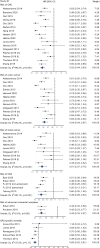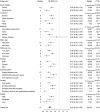Combined Effect of Healthy Lifestyle Factors and Risks of Colorectal Adenoma, Colorectal Cancer, and Colorectal Cancer Mortality: Systematic Review and Meta-Analysis
- PMID: 35936678
- PMCID: PMC9353059
- DOI: 10.3389/fonc.2022.827019
Combined Effect of Healthy Lifestyle Factors and Risks of Colorectal Adenoma, Colorectal Cancer, and Colorectal Cancer Mortality: Systematic Review and Meta-Analysis
Abstract
Background: In addition to adiposity, lifestyle factors such as poor diet, low physical activity, alcohol intake and smoking are noted to be associated with the development of colorectal cancer (CRC). This study aims to investigate the association and dose-response relationship between adherence to a healthy lifestyle and CRC risk.
Methods: A systematic literature search was conducted in MEDLINE and EMBASE for studies examining multiple lifestyle factors with risk of CRC, incident colorectal adenoma (CRA), and CRC-specific mortality through June 2021 without restrictions on language or study design. Meta-analysis was performed to pool hazard ratios using random-effects model. Subgroup analyses were performed based upon study and sample characteristics. Random-effects dose-response analysis was also conducted for CRC risk to assess the effect of each additional healthy lifestyle factor.
Results: A total of 28 studies (18 cohort studies, eight case-control studies, and two cross-sectional study) were included. When comparing subjects with the healthiest lifestyle to those with the least healthy lifestyle, the pooled HR was statistically significant for CRC (0.52, 95% CI 0.44-0.63), colon cancer (0.54, 95% CI 0.44-0.67), rectal cancer (0.51, 95% CI 0.37-0.70), CRA (0.39, 95% CI 0.29-0.53), and CRC-specific mortality (0.65, 95% CI 0.52-0.81). The pooled HR for CRC was 0.91 (95% CI: 0.88-0.94) for each increase in the number of healthy lifestyles. The inverse association between healthy lifestyle and CRC risk was consistently observed in all subgroups (HR ranging from 0.26 to 0.86).
Conclusions: Adoption of a higher number of healthy lifestyles is associated with lower risk of CRC, CRA, and CRC-specific mortality. Promoting healthy lifestyle could reduce the burden of CRC.
Systematic review registration: https://www.crd.york.ac.uk/PROSPERO/display_record.php?RecordID=231398, identifier CRD42021231398.
Keywords: colorectal, lifestyle; dose-response; incident; index; prevention.
Copyright © 2022 Yu, Feng, Kim and Zhu.
Conflict of interest statement
The authors declare that the research was conducted in the absence of any commercial or financial relationships that could be construed as a potential conflict of interest.
Figures




Similar articles
-
Dietary-Lifestyle Patterns and Colorectal Cancer Risk: Global Cancer Update Programme (CUP Global) Systematic Literature Review.Am J Clin Nutr. 2025 May;121(5):986-998. doi: 10.1016/j.ajcnut.2025.01.014. Epub 2025 Jan 11. Am J Clin Nutr. 2025. PMID: 39805561
-
No association between hepatitis C virus infection and risk of colorectal cancer: a systematic review and meta-analysis of cohort studies.Front Med (Lausanne). 2024 Jun 4;11:1327809. doi: 10.3389/fmed.2024.1327809. eCollection 2024. Front Med (Lausanne). 2024. PMID: 38898936 Free PMC article.
-
Association between metabolic dysfunction-associated steatotic liver disease and risk of colorectal cancer or colorectal adenoma: an updated meta-analysis of cohort studies.Front Oncol. 2024 Jul 9;14:1368965. doi: 10.3389/fonc.2024.1368965. eCollection 2024. Front Oncol. 2024. PMID: 39045565 Free PMC article.
-
Association of modifiable lifestyle with colorectal cancer incidence and mortality according to metabolic status: prospective cohort study.Front Oncol. 2023 May 30;13:1162221. doi: 10.3389/fonc.2023.1162221. eCollection 2023. Front Oncol. 2023. PMID: 37324025 Free PMC article.
-
Does aspirin reduce the incidence, recurrence, and mortality of colorectal cancer? A meta-analysis of randomized clinical trials.Int J Colorectal Dis. 2021 Aug;36(8):1653-1666. doi: 10.1007/s00384-021-03889-8. Epub 2021 Feb 16. Int J Colorectal Dis. 2021. PMID: 33594505
Cited by
-
Increased risk of colorectal cancer in young males with higher cardiovascular risk: A nationwide population-based cohort study.World J Gastrointest Oncol. 2025 Mar 15;17(3):101260. doi: 10.4251/wjgo.v17.i3.101260. World J Gastrointest Oncol. 2025. PMID: 40092948 Free PMC article.
-
Healthy Lifestyle and Quality of Life in Post-Operative Colorectal Cancer Patients: A Five-Month Observational Study.Nutrients. 2023 Dec 25;16(1):68. doi: 10.3390/nu16010068. Nutrients. 2023. PMID: 38201897 Free PMC article.
-
LGALS4 inhibits glycolysis and promotes apoptosis of colorectal cancer cells via β‑catenin signaling.Oncol Lett. 2025 Jan 7;29(3):126. doi: 10.3892/ol.2025.14873. eCollection 2025 Mar. Oncol Lett. 2025. PMID: 39807100 Free PMC article.
-
Clinical and endoscopic characteristics of colorectal traditional serrated adenomas with dysplasia/adenocarcinoma in a Korean population.World J Gastrointest Oncol. 2025 Feb 15;17(2):101780. doi: 10.4251/wjgo.v17.i2.101780. World J Gastrointest Oncol. 2025. PMID: 39958542 Free PMC article.
-
B-Myb deficiency boosts bortezomib-induced immunogenic cell death in colorectal cancer.Sci Rep. 2024 Apr 2;14(1):7733. doi: 10.1038/s41598-024-58424-w. Sci Rep. 2024. PMID: 38565963 Free PMC article.
References
Publication types
LinkOut - more resources
Full Text Sources

